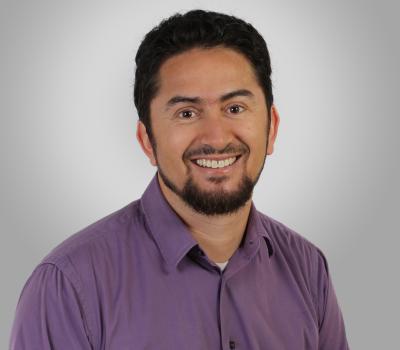
It never snowed in Tunisia where Bechir Hamdaoui grew up. So, moving to Madison, Wisconsin for graduate school where it snows all winter was a bit of a challenge — not to mention the lack of televised soccer games. More seriously, it was difficult for him to be away from his family and friends especially since he did not return to see them for the first three years of school in the U.S. But he was dedicated to getting the best education he could.
“I still remember the weird feeling I had when I finished my engineering degree and felt I had to leave school. It really felt like losing something very dear to my heart,” he says.
In his first year out of college he worked as a quality control and planning engineer on a power generation plant project. “That taught me a lot,” he says. “I learned what I didn’t want to do.”
So, instead he pursued his long-time interest in becoming a professor and received two Masters degrees (one in electrical & computer engineering and one in computer sciences) and his Ph.D. in electrical & computer engineering from the University of Wisconsin-Madison.
Early on he realized he loved teaching. As a teenager he tutored his two younger sisters in physics and math, and later he tutored other students to earn money during college.
“I always feel excited about teaching — an hour and a half class still goes very fast,” he says, explaining that he gets a lot of satisfaction from seeing when students grasp a concept for the first time.
“But the other component I like a lot is research. The nice thing about research is that you always have new challenging problems to solve.”
Hamdaoui’s research focuses on improving next-generation wireless networks to support newly emerging wireless services and applications.
“Whether used for e-Health to deliver healthcare information to practitioners, for Facebook to keep up with your friends, for environmental sensing and monitoring to prevent forest fire breakouts, or for GPS to locate your favorite restaurant in town, all these handheld wireless devices need and rely on one resource — radio spectrum. The bad news is that this precious network resource is limited. And my job is to come up with innovative ways that make the best use of it so that we can accommodate all these new services,” he says.
His research on next-generation wireless systems earned him an NSF CAREER award in 2009 from the National Science Foundation, given to the most promising researchers at the beginning of their careers. He also has recently received a best paper award for his work.
Another part of the research he enjoys is the interaction with his graduate students. “I really like mentoring the graduate students, but then at some point you start learning from them which is also a nice feeling,” he says.
In his first few years at OSU, Hamdaoui worked very hard at building his career, but now as a newlywed he is learning how to balance career and family. Once an avid soccer player, Hamdaoui says he has switched to safer sports like hiking which his wife also enjoys and they have started exploring Oregon together.
And although he is thankful that it rarely snows in Corvallis, he came to love Madison and the experiences he had there which were the fulfillment of a dream.
“Because of my craving for learning, I never wanted to leave college,” he says.

